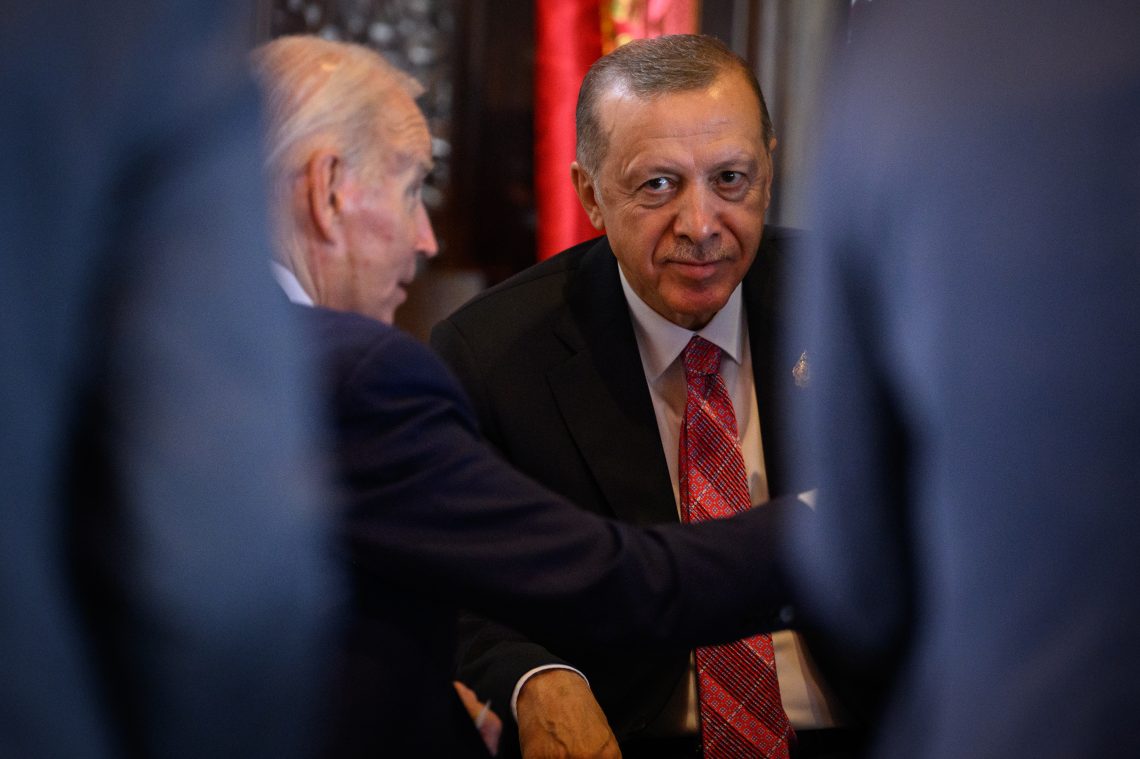The future of U.S.-Turkey relations
With the Turkish president securing another five-year term, his nation’s ties with the United States will likely stay on an even keel or improve during the Biden administration.

In a nutshell
- Russia’s war forced President Joe Biden to improve ties with strategic allies
- Turkish and American interests align on many geopolitical and economic fronts
- Expect fewer U.S. lectures on democracy and more cooperation on defense
Despite President Joe Biden’s declared democracy promotion agenda, relations between America and Turkey will likely remain stable and may even improve throughout the remainder of the United States president’s term.
With President Biden’s swearing-in as U.S. president on January 20, 2021, came a claim that the administration would reassert the promotion of democracy globally as a principal instrument of American foreign policy. This objective was also asserted in the administration’s National Security Strategy published in 2022.
The most visible representation of the policy was the U.S.-sponsored Summit for Democracies in 2023. Turkey was among the allies that the Biden team declined to invite to the summit.
More on Turkey by Klaus Wölfer
As Turkey begins its second century, uncertainty looms
Turkey’s balancing act on security
Turkey seeks to repair its foreign relations
Promoting democracy unevenly
“They’re NATO allies, and we’re going to continue to work together with them on lots of different issues of mutual concern,” National Security Council spokesman John Kirby stated in a call with reporters before the summit, but “at the same time, we’re committed to supporting democratic institutions, human rights, the rule of law [and] media freedom.” The U.S. administration was signaling major concerns with democratic backsliding under President Recep Tayyip Erdogan.
Turkey was not the only friendly power singled out for criticism. Hungary, ruled by Prime Minister Viktor Orban, was not invited to the summit. The U.S. administration also consistently singled out Poland and Israel for criticism over judicial reforms and other issues.
The problem with the administration’s application of democracy promotion is that it is so unevenly applied that it is seen as illegitimate and ineffective. Before Russia’s war on Ukraine, the administration attempted to improve relations with Russia. President Biden continues to seek to engage Iran. Even as competition with China increases, the U.S. wants to work constructively with Beijing on a range of issues, especially climate policy. On the other hand, it singled out democracies with center-right governments for ridicule, principally over policy differences, often reflecting domestic U.S. political sensitivities and an effort to strengthen relations with the European Union by joining criticism of nations targeted for punishment by Brussels.
After Russia’s full-scale invasion of Ukraine, however, the administration quickly discovered that politically isolating strategic allies was unworkable. Washington has had to work closely with Turkey and Poland. Failing to secure a new Iran Deal to prevent Tehran’s acquisition of nuclear weapons, and with continuing instability in Syria and Lebanon, the U.S. has had to renew close security cooperation with Israel.
President Erdogan, in response, helped on some of the most contentious issues by putting aside the democracy snubs in favor of stabilizing relations with Washington and other Western-allied capitals during the reelection bid that he won on May 28, 2023. Examples include greenlighting Finland’s accession to NATO and brokering the Ukraine grain export compromise.

An alignment of agency
Many speculated that an opposition victory would lead to better relations among Ankara, Washington, Europeans and the Middle East. The expectation of significant shifts in Turkish policies was overblown. There is also reason to expect Mr. Erdogan to adopt very similar policies.
Even with a strong popular mandate, President Erdogan faces significant challenges at home, including national recovery from the recent earthquake and staggering inflation. Turkey can ill afford foreign adventures that add to the nation’s woes. Conversely, the country needs foreign investment, trade and international economic partnerships to deliver growth.
With the election in the rearview mirror, the U.S. has to be realistic and recognize there are several issues in which American and Turkish interests complement each other, or at the very least, do not overtly conflict:
Russia. Turkey will never completely isolate Russia or break relations. That said, Ankara has never had a trusted relationship with Moscow, nor do prospects exist for a partnership. Indeed, Turkey views membership in NATO as vital to its national interests, an insurance card against Russian expansion.
The Black Sea. While Turkey will never consent to revise the Montreux Convention of 1936, which allows Ankara authority over the passage of military ships into the Black Sea, it remains in Turkey’s interest to see a free and open Black Sea to unimpeded commercial traffic, as well as the safety of undersea cables and pipelines. While Ankara remains wary of an increased NATO presence in the Black Sea, it will likely be more amenable to cooperation among the littoral nations to safeguard undersea, surface and airspace commercial activities.
Middle Corridor. Developing energy, transport and supply-chain corridors through the Caucasus to the Central Asian nations is a project that would serve the interests of Europe, the U.S. and Turkey equally well. Through The Organization of Turkic States (Azerbaijan, Kazakhstan, Kyrgyzstan, Turkey and Uzbekistan), Ankara is part of an intergovernmental body that can be an essential instrument for cooperation.
Greece. The U.S. is keenly interested in improving the bilateral cooperation between Ankara and Athens’ center-right, pro-U.S. government. Relations between the two countries have improved since the earthquake and the Greek effort to contribute humanitarian support.
Armenia. Recent negotiations between Armenia and Azerbaijan could improve regional stability and reduce the influence of Iran and Russia, which would benefit Turkey, Europe and the U.S.
The Middle East. Turkey has a mixed bag of relations with Israel and the Arab states. For example, relations between Turkey and Egypt have been at a nadir for years, with virtually no direct dialogue between the two governments. It is in U.S. interests for more harmonious relations. The postelection prospects for more outreach from Ankara seem promising. Regional analyst James Dorsey noted that, after years of strained relations, Saudi and Emirati support for Mr. Erdogan was quickly displayed after the Turkish leader’s reelection.
Africa. While U.S. and Turkish interests do not always align in Africa, Ankara is determined to play a more active role in the continent. The U.S., Europe and Turkey share a common interest in mitigating malicious Chinese and Russian behavior, particularly in North Africa and sub-Saharan Africa.
Scenarios
The most likely future scenario is that U.S. and Turkish relations will remain stable in the near term. Heading into national elections in the U.S., where foreign policy is not decisive, look for the Biden administration not wanting to add new confrontations with allies. Turkey remains a controversial issue with some members of Congress, but it is unlikely that leadership from either party would like to have a significant confrontation over U.S.-Turkish relations.
One possible wild card could be migration if Turkey triggered a major crisis with Europe.
The conditions for stable relations are clear – Sweden’s accession to NATO, transfers of F-16s to Turkey and reintegration of Turkey into the F-35 fighter program. Beyond these expectations, signs of a warming relationship might include closer cooperation on Syria, Libya or the Middle Corridor countries.









